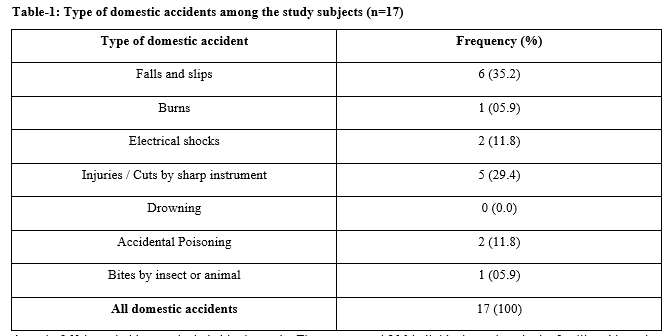Study of household accident prone areas in rural Saharanpur
Abstract
Introduction: Household accidents cause injury to the affected individual along with stress and economic strain to the family. Studies on household accident prone areas in rural area of India are rare.
Objective: The present study was conducted to assess the prevalence of domestic accidents and rural household accident prone areas.
Methods: The study was done in the village Pilkhani, Saharanpur, Uttar Pradesh from October to December 2018. Sixty houses were randomly selected in the village. Information regarding household accident prone areas was gathered by interviewing the head of the family or the adult informant and accident prone areas were observed in the household. The analysis was done using MS Excel software.
Results: Prevalence of domestic accidents was 8.25% with falls being the most common. Uneven brick/kacha floor, floor at different levels, improper electric fittings, fodder cutting machine and low clothes line were frequently found accident prone areas identified in the households.
Conclusion: In order to prevent and control the domestic accidents, creation of awareness among the community and inculcation of household safety measures using Information Education and Communication interventions have to be strived for along with structural modification of accident prone areas in the household.
Downloads
References
2. Sunder Lal, Adarsh, Pankaj (2014) Epidemiology of Non-Communicable Diseases and Related National Health Programmes. In: Text book of Community Medicine. 4th ed. CBS Publications; New Delhi.
3. Govt of India. Swasth Hind. 1979; 25(12): 329.
4. Galal S; Working with families to reduce the risk of home accidents in children. East Meditr Hlth J. 1999; 5(3): 572-582.
5. Park K. Epidemiology of Chronic Non-Commu-nicable Diseases and Conditions. In: Park's Text Book of Preventive and Social Medicine. 25th ed. Bhanot Publications; Jabalpur. 2019
6. The Royal Society for the Prevention of Accidents. Preventing Accidents in the Home [Internet] 2019 [updated 2019 Mar 25; cited 2019 Jun 10]. Available from: https://www. rospa.com/home-safety/advice/ general / preventing-accidents-in-the-home/
7. Ramesh Masthi NR, Kishore SG, Gangaboriah. Prevalence of Domestic Accidents in the Rural Field Practice Area of a Medical College in Bangalore, Karnataka. Indian J Public Health. 2012;56(3):235-237. doi: 10.4103/0019-557X.104262.
8. Radhakrishnan S, Nayeem A. Prevalence and factors influencing domestic accidents in a rural area in Salem district. Int J Med Sci Public Health. 2016;5(8):1688-1692. doi: 10.5455/ijmsph.2016.09122015287.
9. Sudhir, Krishna D, Channabasappa AN, Dhar M. Prevalence of domestic accidents in rural India: a cross-sectional study.Sch J App MedSci.2014;2(2B):657–659
10. George S, Paul N, Francis PT, Leelamoni K. Prevalence of domestic accidents in a rural area of Kerala: a cross sectional study. Int J Community Med Public Health. 2017;4(4):949-953. doi:10.18203/2394-6040.ijcmph20170949.
11. Netra G, Nawaz AS, Kumar A, Kusum M, Rao BAV. A cross-sectional study on domestic accidents in the urban field practice area of a private medical college, Davangere, Karnataka. Int J Community Med Public Health. 2017;4(9):3354-3359. doi: 10.18203/ 2394- 6040. ijcmph20173844.
12. Bhanderi DJ, Choudhary S. A study of occurrence of domestic accidents in semi-urban community. Indian J Community Med. 2008;33(2):104-106. doi: 10.4103 /0970- 0218. 40878.
13. Avsarogullari L, Sozuer E, Ikizceli I, Kekec Z, Yurumez Y, Ozkan S. Adult burn injuries in an Emergency Department in Central Anatolia, Turkey: a 5-year analysis. Burns. 2003; 29(6): 571-577. doi: https://doi.org/10.1016/S0305-4179(03)00140-2
14. Marsh D, Sheikh A, Khalil A, Kamil S, Jaffer-uz-Zaman, Qureshi I, et al. Epidemiology of adults hospitalized with burns in Karachi, Pakistan. Burns. 1996; 22 (3): 225–229. doi:10.1016/0305-4179(95) 00114-X.
15. Neghab M, Fard RA, Habibi M, Choobineh A. Home accidents in rural and urban areas of Shiraz, 2000–2002. East Mediterr Health J.2006;12(6):824–833
16. Shawon SR, Hossain FB, Rahman M, Ima SZ. Domestic accidents in a rural community of Bangladesh: a cross-sectional study on their incidence and characteristics. Develop Countr Stud. 2012;2(7): 14–19.
17. Sirohi S, Pandey D, Dixit S, Jain C, Deshmankar B, Raja RS. Domestic accidents: an emerging threat to community. Int J Med Sci Public Health. 2015;4(9): 1202-1205. doi: 10.5455/ijmsph.2015.14012015237.

Copyright (c) 2019 Author (s). Published by Siddharth Health Research and Social Welfare Society

This work is licensed under a Creative Commons Attribution 4.0 International License.


 OAI - Open Archives Initiative
OAI - Open Archives Initiative


